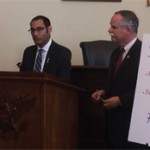What We Need To Do Together
There is a lot of optimism that the SGR, this perennial problem for predicting the solvency for our practices or units, probably will be solved. However, as I write this, the end result is not really known. It is not clear that Congress will pull us back from the SGR cliff. It is possible that SGR reform will be included in the broad package of reform Congress seems to be contemplating. It is also possible that the stalemate in Congress will continue, and SGR reform will again be neglected. Those of you who have been advocates for the ACR know well that getting anything done in Washington, D.C., takes patience and hard work. This is true not just for us, but for the lawmakers and staff who must create and pass legislation.
The heavy lifting to create and support a plan for replacing the SGR is done now, and there is strong bipartisan support to bring physician payment back to more solid footing. However, SGR reform carries a high price in cost and priority. The cost of around $140 to $180 billion is difficult for Congress to find unless it includes SGR in a larger budgetary package. With all of the pressure to negotiate the specific “grand bargain” package, it will take tremendous effort to keep SGR reform in the spotlight and on the table.
My call to you, and to all of our colleagues, is twofold. First, do not automatically let “perfect” be the enemy of “better” when considering how we can end the SGR. Second, do not become complacent and expect that SGR reform will definitely happen. It is true that leaders in Congress have committed to getting this done for us. We had all fantasized that Congress would pass a simple one-sentence law that repealed the SGR, but that will not happen. In return for this change, they are asking us to include more focus on quality measures in our daily practices, and their proposal also reflects the reality and constraints of the current federal budget. Whatever happens will require change on our part, too, but change is inevitable. We must work together and with Congress to solve this perennial problem for the sake of our patients and our practices. We don’t want to spend another ten years staring into the abyss.
Rheumatology Will Lead
Even after SGR reform is passed, work will remain. We must, as a subspecialty, accept the new demands regarding how we care for patients and how we report that care. How well we handle those demands will determine how well we will be paid for the care we provide. The ACR is building on its already robust quality initiatives and working with Congress and CMS from the outset to ensure appropriate measures exist for rheumatologists under any new program. We will also continue to inform and train our members on how they many need to modify their practices to fit the new framework.
